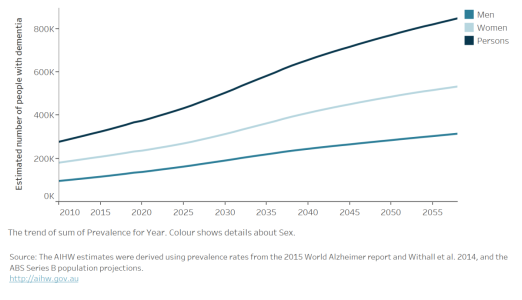A shocking new study finds that retiring early could lead to a faster onset of dementia - here's why
- Replies 5
Retirement is something many of us look forward to - in fact, according to a survey we did last year, over 90% of SDC members are already retired or work part-time. But a groundbreaking new study suggests that retiring too early may actually accelerate the onset of dementia.
The study, published in the Journal of Economic Behavior & Organisation, used data from China's National Rural Pension Scheme (NRPS) to analyse how retirement plans affect cognitive performance.
The results of the study revealed that those who retired early were more likely to report poorer cognitive performance than those who remained working.
The researchers believe the biggest factor of cognitive decline was delayed recall, which is associated with predicting the onset of dementia.
Delayed recall refers to the ability to recall information after time has passed. In the context of Alzheimer's testing, delayed recall is often used as a measure of memory impairment. For example, a test might involve showing a person a list of words, like toe, kettle, and horse, and then asking them to recall as many of those words as possible after a delay of several minutes or hours.
Lead author of the study Plamen Nikolov, Assistant Professor of Economics at Binghamton University, State University of New York (SUNY), said that social engagement may be an important factor in a person's continued cognitive performance.
‘Social engagement and connectedness may be the single most powerful factors for cognitive performance in old age,’ he said.
Although they cannot be certain that early retirement was the true cause of the cognitive decline, the researchers say it's important that seniors are encouraged to stay socially engaged and mentally active to help prevent the onset of dementia.
Dementia is an umbrella term used to describe a range of progressive neurological disorders that can cause memory loss, difficulty thinking and behavioural changes. Alzheimer's disease is the most common form of dementia, and is most likely to occur in those aged over 65. Data from the NHS indicates the risk of Alzheimer's disease and other types of dementia increases with age, affecting an estimated 1 in 14 people over the age of 65 and 1 in every 6 people over the age of 80.
According to the AIHW, in 2022, it was estimated that between 386,200 and 487,500 Australians were living with dementia. Their projections indicate that the number of Australians with dementia will more than double by 2058 – from 386,200 in 2021 to 849,300 in 2058.
Currently, there is no cure for dementia. But as always, early detection is beneficial as it can help people find the most effective treatments available, and there are some promising new drugs that may slow its progress, though the jury’s still out on their effectiveness.
Medication aside, lifestyle choices such as regularly exercising, managing stress, and avoiding excess alcohol consumption can reduce the risk of developing dementia. A diet rich in fruits and vegetables, and fish can also provide numerous benefits and help lower the risk of developing age-related illnesses. Other preventative measures may include quitting smoking, engaging in social activities, and pursuing intellectually-stimulating hobbies.
Similarly, it is important to manage any pre-existing medical conditions that may be linked to the likelihood of developing dementia, such as hypertension and diabetes. This can be done through monitoring and managing cholesterol levels and blood pressure, along with ensuring regular screening to identify any conditions that may become problematic.

By taking sensible precautions and doing our best to adopt healthy habits, we are taking active steps to reduce our risk of developing dementia in later life. We may not be able to eliminate the risk of dementia entirely, but with sensible preparation, we can learn to mitigate the risk and live our lives to the fullest.
By the way, members, can you recall the 3 words I mentioned above? They were toe, kettle, and horse. Sorry for the sneaky test! If you’re not doing so already, we recommend playing our daily brain training games (like OzWord) and chatting with other members to stay sharp!
The study, published in the Journal of Economic Behavior & Organisation, used data from China's National Rural Pension Scheme (NRPS) to analyse how retirement plans affect cognitive performance.
The results of the study revealed that those who retired early were more likely to report poorer cognitive performance than those who remained working.
The researchers believe the biggest factor of cognitive decline was delayed recall, which is associated with predicting the onset of dementia.
Delayed recall refers to the ability to recall information after time has passed. In the context of Alzheimer's testing, delayed recall is often used as a measure of memory impairment. For example, a test might involve showing a person a list of words, like toe, kettle, and horse, and then asking them to recall as many of those words as possible after a delay of several minutes or hours.
Lead author of the study Plamen Nikolov, Assistant Professor of Economics at Binghamton University, State University of New York (SUNY), said that social engagement may be an important factor in a person's continued cognitive performance.
‘Social engagement and connectedness may be the single most powerful factors for cognitive performance in old age,’ he said.
Although they cannot be certain that early retirement was the true cause of the cognitive decline, the researchers say it's important that seniors are encouraged to stay socially engaged and mentally active to help prevent the onset of dementia.
Dementia is an umbrella term used to describe a range of progressive neurological disorders that can cause memory loss, difficulty thinking and behavioural changes. Alzheimer's disease is the most common form of dementia, and is most likely to occur in those aged over 65. Data from the NHS indicates the risk of Alzheimer's disease and other types of dementia increases with age, affecting an estimated 1 in 14 people over the age of 65 and 1 in every 6 people over the age of 80.
According to the AIHW, in 2022, it was estimated that between 386,200 and 487,500 Australians were living with dementia. Their projections indicate that the number of Australians with dementia will more than double by 2058 – from 386,200 in 2021 to 849,300 in 2058.
Currently, there is no cure for dementia. But as always, early detection is beneficial as it can help people find the most effective treatments available, and there are some promising new drugs that may slow its progress, though the jury’s still out on their effectiveness.
Medication aside, lifestyle choices such as regularly exercising, managing stress, and avoiding excess alcohol consumption can reduce the risk of developing dementia. A diet rich in fruits and vegetables, and fish can also provide numerous benefits and help lower the risk of developing age-related illnesses. Other preventative measures may include quitting smoking, engaging in social activities, and pursuing intellectually-stimulating hobbies.
Similarly, it is important to manage any pre-existing medical conditions that may be linked to the likelihood of developing dementia, such as hypertension and diabetes. This can be done through monitoring and managing cholesterol levels and blood pressure, along with ensuring regular screening to identify any conditions that may become problematic.
Key Takeaways
- A study on people in rural China has found that people who stop working at around 60 years old suffer sharper cognitive decline than their peers.
- Experts recommend people play word games and read in retirement to stay mentally active and avoid cognitive problems.
- The study found that the greatest indicator of cognitive decline was delayed recall, a measure commonly associated with predicting dementia in a patient.
- Dementia is a global concern, with an estimated 900,000 people living with dementia in the UK and 5.5 million in the USA. There is currently no cure for dementia, but new drugs can slow down its progression.
By taking sensible precautions and doing our best to adopt healthy habits, we are taking active steps to reduce our risk of developing dementia in later life. We may not be able to eliminate the risk of dementia entirely, but with sensible preparation, we can learn to mitigate the risk and live our lives to the fullest.
By the way, members, can you recall the 3 words I mentioned above? They were toe, kettle, and horse. Sorry for the sneaky test! If you’re not doing so already, we recommend playing our daily brain training games (like OzWord) and chatting with other members to stay sharp!








